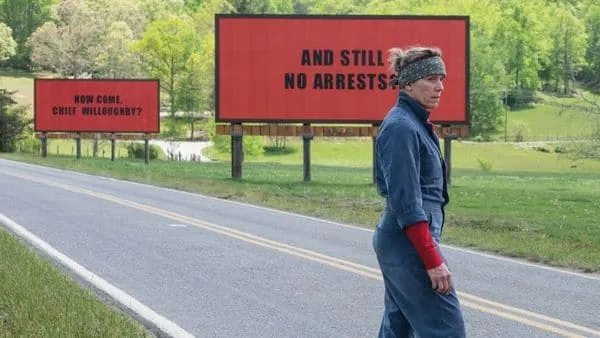 |
| 'McDormand is sensational as Mildred: hard to love, impossible to ignore and strangely disarming even with a Molotov cocktail in hand' Photo: Courtesy of Venice Film Festival |
Before the Best Picture predictions came along, the Venice Film Festival enjoyed an enviable run as a great place to start an actor’s awards campaign: the Lido is where Helen Mirren, Mickey Rourke and Colin Firth all had their first brush with vindication for The Queen, The Wrestler and A Single Man respectively. And although jury head Annette Bening arrived without her latest project – the likely Oscar/Bafta double-threat Film Stars Don’t Die In Liverpool, which will go to Toronto instead – there were enough remarkable performances here to keep everyone guessing as to the likely recipients of the weekend’s awards.
Certainly, some of those performances could be found in one film: Martin McDonagh’s Three Billboards Outside Ebbing, Missouri, which drew a standing ovation for its leading lady, Frances McDormand. Pitched by its trailer as plucky underdog story, McDonagh’s film is actually a good deal darker, and all the better for it. McDormand plays Mildred Hayes, a bereaved mother who pays for three billboards outside her home, berating the local sheriff for failing to find the man who raped and killed her daughter. It seems reasonable at first – until we meet that sheriff, a gentle, kind family man named Bill (Woody Harrelson), who has the sympathy and support of local community. Mildred declares war on the police, but her quest for justice soon reveals a lot more about her guilt and her loneliness, having been abandoned by her abusive husband (John Hawkes) for a quite comically younger woman.
McDormand is sensational as Mildred: hard to love, impossible to ignore and strangely disarming even with a Molotov cocktail in hand. But just as good is Sam Rockwell, as the cop shop’s nerdy redneck Officer Dixon, who develops from a no-good, violent racist into the film’s unlikely hero. Working mostly in the indie sector, Rockwell has been Hollywood’s nearly-man for years now, and Three Billboards shines an all-too-rare spotlight on his considerable talents.
 |
| Lean On Pete: 'Haigh reveals himself as, potentially, a very capable player on the international scene' Photo: Courtesy of Venice Film Festival |
Otherwise, the festival this year seemed to have a special fondness for older stars, presenting such what’s-this-doing-here? grey-pound landfill as Our Souls At Night (Robert Redford and Jane Fonda) and The Leisure Seeker (Donald Sutherland and Helen Mirren). But the most surprising of the prestige bunch was Stephen Frears’ Victoria And Abdul (read full review), which does little to extend the canon of Queen Victoria movies, amounting to little more than a mild late-19th century version of In The Loop. Needless to say, Judi Dench is fantastic as the queen – bored of life, bored of ruling – but the film’s relentlessly light-hearted tone, peppered with jarringly modern barbs at colonialism, doesn’t serve her well.
Also from the UK came Lean On Pete, the first US film by Andrew Haigh. Following Andrea Arnold’s example by unapologetically telling a very American story with no UK angle whatsoever, Haigh reveals himself as, potentially, a very capable player on the international scene, fluidly telling the story of Charley (outstanding newcomer Charlie Plummer), a young trailer-park kid who finds work at the race track under the aegis of the jaded but somehow never seedy Del (Steve Buscemi). For a full hour, Haigh spins a mesmerising yarn, but once Charley leaves the race track, in pursuit of lost family, Lean On Pete (the name of a racehorse), much like Downsizing, seems to wind down rather than come to a specific end.
 |
| The Third Murder: 'Another great acting showcase, and one of the best films in the festival' Photo: Courtesy of Venice Film Festival |
In other hands, this might be a hectoring morality play, but Kore-eda has fashioned something much more ambiguous. While pausing (and frequently) to discuss his favourite topics – mothers and daughters, fathers and sons, fathers and mothers etc – Kore-eda saves the best till last, slyly eroding our trust and judgment until, like Shigemori, we know longer know who or what to believe. It may suggest grand themes, of right and wrong and humanity and justice, but The Third Murder is really about one thing: man’s capacity for irrational acts of evil, and our desperate willingness to believe there must always be a reason to excuse it.
Read our first Venice report on Downsizing, Suburbicon and The Shape Of Water





















